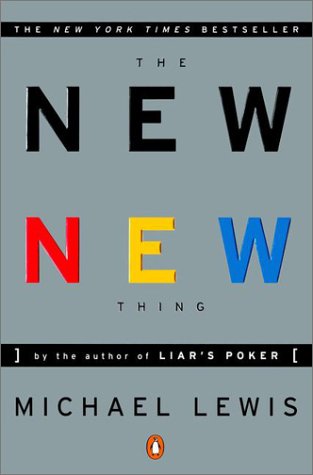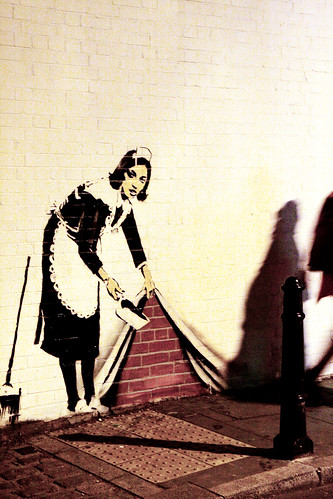
More than any other book on my shelf, the one I just finished reading is perhaps the most comically out of sync with the times. In such a gloomy economic moment as this, it was bizarre reading about Silicon Valley in the late nineties, a time when seemingly dozens of young multimillionaires were minted with each IPO.
The New New Thing, by Michael Lewis, documents the manic rise of Jim Clark, who earned billions founding internet start-ups, such as Netscape. His most important "innovation," however, was helping to drop-kick the U.S. economy into the new era of the bubble.
Clark helped usher in a mentality that has stuck with us even after the Internet bubble popped in 2000. No longer did investors judge companies on such traditional metrics as profits. Instead they sized up a company by considering how fast and how furiously its perceived value might grow. A long track record was no longer essential; it became a liability. As long as stocks were going up and investors were getting rich, the fewer details companies provided, the better.
Bubbles are nothing new, of course. (The textbook example is the tulip mania of 1637.) But until Clark and his ilk in Silicon Valley came along and proved it possible to become billionaires practically overnight did the bubble become the national obsession and a huge part of our economic lifeblood.
Now that the latest bubble (real estate) has popped with such disastrous consequences, we're not sure what to do. Investors don't seem to feel like investing in much of anything outside of Treasury bonds, and the government's plan is to simply pump more money into the economy in the hope that it will jump start growth. We know we've been burned by the boom-and-bust bubble popping cycle of the past, but it seems very unlikely that we'll be able to get our economy back to its previous level without another bubble. In other words, we're on the lookout for a new new thing.
This predicament relates directly to an even bigger predicament: global warming. Interestingly,
Eric Janszen suggested in Harper's last year that the next bubble is probably going to be in the green technology sector.
If it is, the best case scenario would be that the overvaluation (and inevitable collapse) of green tech stocks would leave us with a lot of badly needed alternative energy infrastructure. More likely, Janszen predicts, it would leave us with not much more than wreckage. Many of the dollars invested would be wasted, as they are in any bubble, in hiking up stock prices rather than in any substantive improvements to our infrastructure.
Our ecological problems are very real and getting worse. The solution, however, is not to encourage a speculative bubble in the green tech sector. It's true that alternative energy and the like is destined to be a growing industry. We can certainly wring a lot more efficiency out of our system. However, when politicians promise that the green technology industry will be the next big source of jobs and economic growth, there is a problem.
If the goal is slowing down climate change--and that must be our goal if we're to avoid a host of irreversible ecological disasters--we can't rely on the kind of speculative growth, even "green" growth, that has fueled previous bubbles.
The new new thing can't simply be another bubble, even if it has a green tint to it. As tempting as it might be to imagine a green tech boom saving our economic butts and making us rich once again, such a scenario is not a long-term solution to the global warming calamity.
The new new thing can't be another moneymaking scheme--it has to be political, and it has to mean big changes to the social order.
As Thomas Friedman says, the so called green revolution hasn't been a revolution at all; it's been a party. A real revolution requires sacrifice and entails real change.
This brings me back to the billionaire Internet idea guy, Jim Clark.
I read about his exploits, his greed, his hunger for the new new thing during the dot com heyday with a mixture of aversion and fascination. Always restless, forever moving in new directions, here was a guy who embodied an important strand of the American character. While Clark's motivation appeared to be money and an inability to sit still, his brand of restlessness and his constant need to innovate and experiment are what we need right now. Badly.
Just as Clark looked at markets with an eye for drastic change, we have to be willing to look at our political and social institutions. We need to create the conditions for innovation and experimentation in the way we organize our society. We need to energize and speed up the political process and encourage change--not merely grope around for the next bubble and hope we can return to business as usual.
What will the new new thing be? Let's hope it's not another dead-end economic bubble. The innovation we desperately need probably won't be found in the world of finance or technology. Rather, it will be an idea that shakes up, knocks down, subverts, or revolutionizes the approach we take to solving our collective problems.
 Many Americans may not care about their energy use, but they may care if their neighbors are doing a better job conserving.
Many Americans may not care about their energy use, but they may care if their neighbors are doing a better job conserving.









